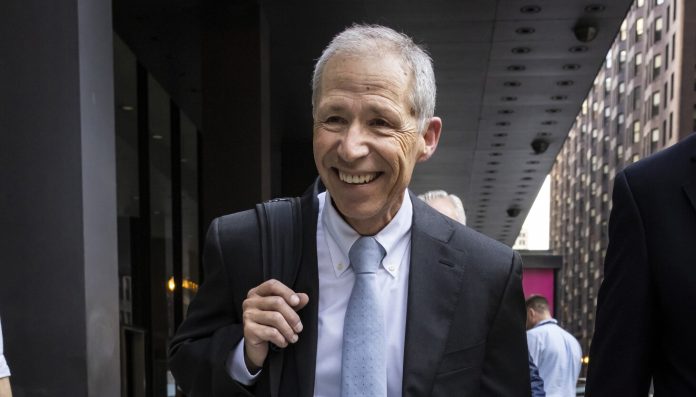The former AT&T Illinois president who allegedly bribed ex-state House Speaker Michael J. Madigan has agreed to resolve his prosecution by paying a $200,000 fine and admitting to most of the feds’ accusations against him.
Still, Paul La Schiazza could walk away without a conviction if he holds up his end of a one-year deal made official Tuesday in the courtroom of U.S. District Judge Robert Gettleman.
It all comes more than a year after a jury failed to reach a verdict in the case.
Under the terms of the so-called deferred prosecution agreement, prosecutors are expected to eventually seek dismissal of the 2022 indictment against La Schiazza.
It would be highly unusual for a judge to object to that request. Still, Gettleman made clear to La Schiazza on Tuesday that he is not bound by the agreement. Rather, he said the deal came “as a bit of a surprise.”
“This is a very generous agreement, I have to say,” Gettleman said from the bench. “I think it’s surprisingly generous.”
La Schiazza’s deal comes after two consecutive juries failed to reach any agreement on the allegations at issue. La Schiazza’s September 2024 trial ended in a hung jury. Then, during the trial of Madigan that followed, prosecutors tried to convict the former speaker for his role in the same alleged plot.
While the jury that convicted Madigan found him guilty on 10 counts involving other schemes, it failed to reach any decision on the AT&T claims. Regardless, Madigan still wound up surrendering Monday to a federal prison camp in West Virginia to serve a 7 ½-year sentence.
At the heart of the case against La Schiazza was legislation meant to help end AT&T Illinois’ costly obligation to provide landline telephone service to all Illinois residents. It was known as its Carrier of Last Resort, or COLR, bill.
In entering into his deal Tuesday, La Schiazza largely admitted to the scheme for which he’d been charged.
Prosecutors say La Schiazza bribed Madigan in 2017 by paying $22,500 to former state Rep. Edward “Eddie” Acevedo (D-Chicago) while trying to finally pass the COLR legislation in Springfield. They also alleged that Madigan wanted to help Acevedo, who left the Legislature early in 2017, because of the increasing Latino population in Madigan’s district.
The feds say Acevedo did hardly any work for the money.
During closing arguments in Madigan’s trial, Madigan attorney Dan Collins said there was no evidence that Acevedo campaigned for, or endorsed, Madigan.
“The suggestion Mike Madigan was concerned about re-election is way off base,” Collins told the jury.
And, “if Eddie Acevedo didn’t do as he signed up to do, that’s on him,” Collins added.
Madigan associate Michael McClain reached out to AT&T Illinois looking for a small contract for Acevedo in February 2017. Then, two days later, McClain told La Schiazza that Madigan had assigned McClain to the COLR legislation as a “special project,” emails showed.
The contract for Acevedo suddenly became an urgent issue for La Schiazza more than a month later, on March 28, 2017, when he told his team he “got a call” and wanted them to “move quickly” on Acevedo’s contract.
Thing is, no one at AT&T Illinois was particularly impressed with Acevedo. The longtime lawmaker had a bad reputation, and Republicans threatened to vote against AT&T’s agenda if Acevedo wound up on the utility’s payroll.
So the utility funneled Acevedo’s money through a firm belonging to lobbyist Tom Cullen. La Schiazza told his staff he had no objection to the arrangement, “as long as you are sure we will get credit and the box checked, and of course we have legal approval to engage Eddie this way.”
The COLR bill became law after the state House and Senate voted July 1, 2017, to override a veto from then-Gov. Bruce Rauner. Madigan voted in favor of the bill and to override the veto.
Less than two weeks later, on July 12, 2017, La Schiazza was asked by Madigan’s son, Andrew Madigan, to sponsor a nonprofit event “at the suggestion of our good friend Mike McClain.” La Schiazza griped by email to a colleague that “this will be endless.”
He later added, “We are on the friends and family plan now.”
Acevedo did not face criminal charges directly related to the AT&T allegations. Rather, he served a six-month prison sentence for tax evasion. McClain also faces a two-year sentence for his role in a similar scheme involving ComEd. McClain is due to surrender Oct. 30.

